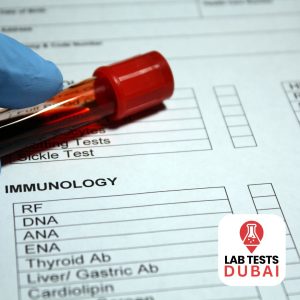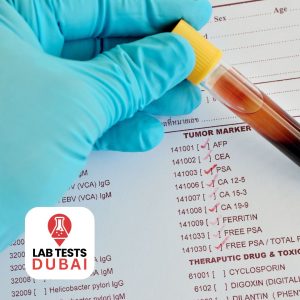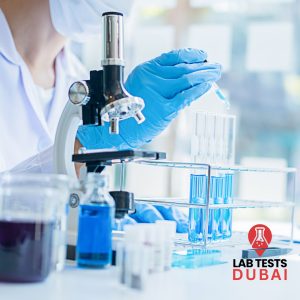
High-Sensitivity HLA-Donor Specific Antibody (DSA) Test for Transplant Compatibility
3.250,00 د.إ
The HLA-Donor Specific Antibody (DSA) test is a highly sensitive diagnostic tool used to detect antibodies directed against donor HLA antigens in transplant recipients. Key features include advanced solid-phase assays for precise antibody identification, high specificity for class I and II HLA antigens, and compatibility with both pre- and post-transplant monitoring.
Sample Type : Serum + EDTA blood
Methodology : Luminex Technology
TAT : 10 Days
Description
High-Sensitivity HLA-Donor Specific Antibody (DSA) Test – Precision Monitoring for Transplant Success
The High-Sensitivity HLA-Donor Specific Antibody (DSA) Test from Lab Tests Dubai is a cutting-edge blood test that detects antibodies directed against the donor’s Human Leukocyte Antigens (HLA)—a major cause of antibody-mediated rejection (AMR) in organ transplant recipients.
After transplantation, the recipient’s immune system may recognize the donor organ as “foreign” and produce donor-specific antibodies (DSA) that attack the graft, leading to:
- Acute or chronic organ rejection
- Reduced graft survival
- Need for re-transplantation
This test is essential for:
- Pre-transplant risk assessment (especially in sensitized patients)
- Post-transplant monitoring (routine or symptomatic)
- Evaluation of declining organ function (e.g., rising creatinine in kidney recipients)
- Guiding desensitization therapy before transplant
- Detecting de novo DSA (new antibodies post-transplant)
Using high-sensitivity Luminex® technology, this advanced assay analyzes serum and EDTA blood to identify IgG antibodies against Class I (HLA-A, B, C) and Class II (HLA-DR, DQ, DP)—with single-antigen bead (SAB) resolution for unmatched precision.
Available with home blood collection and specialized handling, Lab Tests Dubai ensures accurate, timely, and stress-free testing—so transplant patients can protect their life-saving organ.
Why You Need This Test
If you’ve had a kidney, heart, or lung transplant and are experiencing fatigue, swelling, or abnormal lab results, this test could reveal silent antibody-mediated rejection before permanent damage occurs.
You need the HLA-DSA Test if:
- You’re a transplant recipient (kidney, heart, lung, liver)
- You have rising creatinine, liver enzymes, or BNP (signs of organ stress)
- You’re feverish, swollen, or unwell post-transplant
- You’re awaiting transplant and are highly sensitized (high PRA)
- You’ve had previous rejection episodes
- You’re being evaluated for desensitization therapy
- You’re on immunosuppression and need monitoring
This test helps:
- Detect rejection early, before symptoms appear
- Guide immunosuppressive therapy adjustments
- Avoid graft loss from undetected AMR
- Improve long-term transplant survival
Early detection = longer life with your transplanted organ.
Symptoms That Indicate This Test
Consider the HLA-DSA Test if you experience:
✅ For Kidney Transplant Recipients:
- Rising serum creatinine or BUN
- Decreased urine output
- Swelling in legs or face
- High blood pressure
✅ For Heart Transplant Recipients:
- Shortness of breath
- Fatigue, palpitations
- Elevated BNP or troponin
- Fluid retention
✅ For Lung Transplant Recipients:
- Worsening oxygen levels
- Persistent cough or wheezing
- Declining FEV1 on spirometry
✅ General Signs of Rejection:
- Fever, malaise, pain at graft site
- Unexplained weight gain
- Abnormal LFTs or CBC
These signs may point to antibody-mediated rejection (AMR)—and this test provides critical diagnostic clarity.
Natural Production: How DSA Antibodies Threaten Transplant Survival
HLA (Human Leukocyte Antigens) are proteins on cell surfaces that help the immune system distinguish self from non-self.
After transplantation:
- If HLA mismatches exist, the recipient’s immune system may produce IgG antibodies against donor HLA
- These Donor-Specific Antibodies (DSA) bind to the graft’s blood vessels
- Trigger inflammation, complement activation, and endothelial damage
- Lead to acute or chronic antibody-mediated rejection (AMR)
Who’s at Risk?
- Highly sensitized patients (due to prior transplants, pregnancies, or blood transfusions)
- Patients with de novo DSA (developed after transplant)
- Those with poor immunosuppression adherence
This test detects DSA with high sensitivity, even at low levels—before organ function declines.
What Happens If Untreated? Risks of Ignoring DSA
Ignoring positive DSA can lead to:
⚠️ Antibody-Mediated Rejection (AMR) – silent or acute organ injury
⚠️ Chronic Allograft Dysfunction – irreversible scarring and failure
⚠️ Need for Re-Transplantation – with higher risk and lower availability
⚠️ Increased Mortality – especially in heart and lung recipients
⚠️ Wasted Immunosuppression – without targeted therapy
The good news? DSA can be managed with:
- Intensified immunosuppression (e.g., IVIG, rituximab)
- Plasmapheresis (antibody removal)
- Bortezomib or eculizumab (in severe cases)
- Close monitoring and early intervention
Early testing = graft preservation and longer survival.
How to Prepare for the Test
To ensure accurate results:
✅ No fasting required
✅ Continue your regular immunosuppressive medications—do not stop without medical advice
✅ Inform your doctor of:
- Transplant type and date
- Donor HLA type (if known)
- Recent infections or vaccinations
- History of rejection or desensitization
Sample Types Collected:
- Serum (for antibody detection)
- EDTA whole blood (for HLA typing if needed)
Available at select clinics with specialized handling for transplant monitoring.
Test Overview: Luminex® Single Antigen Bead Technology
Interpretation:
- MFI (Mean Fluorescence Intensity):
- <1,000 → Low level (monitor)
- 1,000–5,000 → Moderate (clinical correlation)
- >5,000 → High risk of AMR
- Report includes: Specific HLA targets, MFI, and clinical notes
Results are reviewed by transplant immunology specialists.
Benefits of the HLA-DSA Blood Test
🔹 Early Rejection Detection
Catch AMR before organ function declines.
🔹 Personalized Immunosuppression
Tailor therapy based on DSA profile.
🔹 Pre-Transplant Risk Assessment
Identify sensitized patients needing desensitization.
🔹 Monitor De Novo DSA
Detect new antibodies post-transplant.
🔹 Improve Graft Survival
Prolong life of your transplanted organ.
If you’re a transplant recipient and your labs are changing or you’re feeling unwell, the HLA-Donor Specific Antibody Test gives you the answers you need in 10 days.






Reviews
There are no reviews yet.